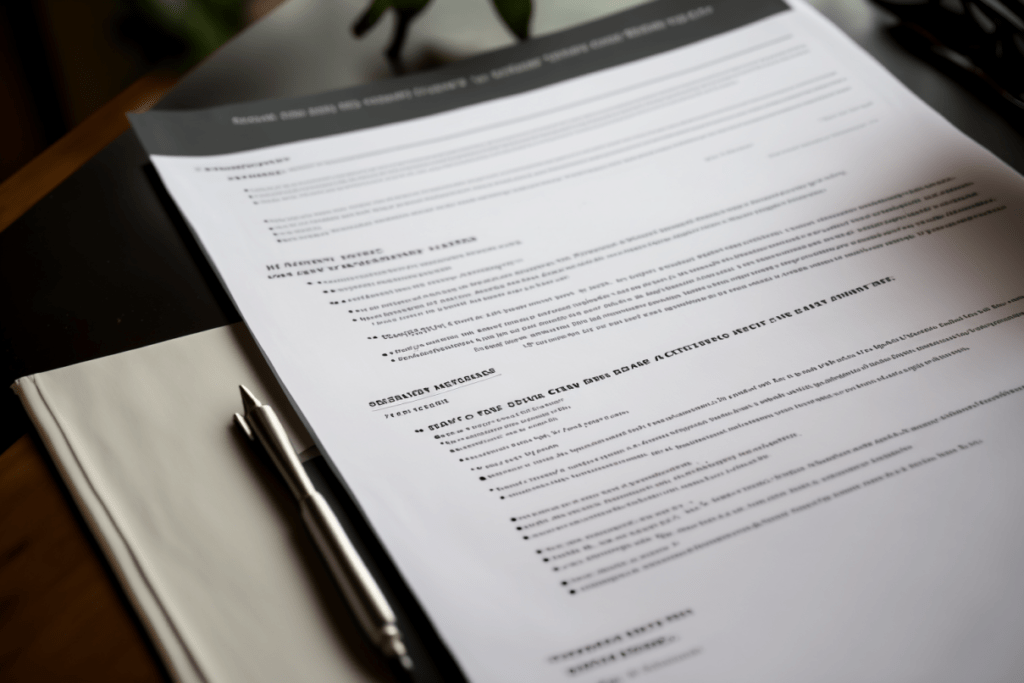When it comes to securing your ideal job, creating a professional CV is critical
It’s important knowing how to sell yourself on a resume; Whether you’re a fresh graduate or a seasoned professional searching for a new opportunity, a strong CV may make all the difference.
In this post, we’ll walk you through the five easy stages of marketing yourself on a resume.

What is the significance of a resume?
Before we get started, let’s talk about why a resume is so important in the employment process.
Companies get a large number of applications for each job position and simply do not have the time to meet with each prospect. Here is where your resume comes in: it summarizes your education, experience, talents, and contact information, making the recruiting process more effective.
Your resume is an employer’s initial impression of you, and it may make or break your chances of getting picked for an interview. A well-crafted CV shows that you are a serious applicant who is willing to put in the work to create a good first impression.
What aspects should your resume contain?
Every resume should contain the following crucial elements:
- Your complete name, phone number, email address, and postal address in your contact information (if applicable).
- Professional summary: Include a quick outline of your abilities, experience, and professional ambitions in this part.
Education:
Enter your academic credentials in reverse chronological order, beginning with your most recent degree.
Experience:
Provide your work experience in this part, including job titles, dates of employment, and important duties and accomplishments. Add any applicable talents you have, such as competence in a certain software application or language.
On a CV, how do you promote yourself?
Now that you know why a resume is important and what it should contain, let’s look at the five actions you can take to market yourself as the greatest applicant for the job:
Make your CV relevant to the job posting: Examine the job description and tailor your CV to showcase the skills and experiences most relevant to the role.
Employ powerful action verbs: To illustrate your effect in past employment, begin each bullet point in your experience section with a strong action verb.
Calculate your accomplishments: Use precise data and statistics to show your accomplishments and the value you provided to your prior companies wherever feasible.
Display your personality: Although your CV should be professional, it is OK to show your individuality. Employ language that shows your unique talents and distinguishes you from other prospects.
Keep it brief: Although it is critical to include all required information, make sure your resume is simple to read and free of superfluous fluff.
Strive for no more than one to two pages

Finally, your resume is your opportunity to create a good first impression and stand out from the crowd. Following these five steps will help you pitch yourself as the best applicant for the position and enhance your chances of getting an interview. Best wishes!
A captivating CV is an important step in the job application process. Although there is no set style for a resume, it should contain crucial features that provide the employer with a clear picture of what you can provide to their company.
Your resume provides you with the chance to highlight your prior job experience, education, talents, and accomplishments in a succinct and informative way. Since many companies use resumes as a preliminary screening tool, it’s critical that your resume stands out and gets their attention. A strong CV is often required to get to the interview stage of the application process.
What should a resume include?
Some parts should be included in your resume to present the employer with as much information about you as feasible. Here are some examples:
Contact information: Your contact information is the first and most critical thing to mention on your resume. Provide your complete name, phone number, email address, and postal address (if applicable).This enables the company to readily contact you with more inquiries or to arrange an interview. Your contact information is the first and most critical thing to mention on your resume. Provide your complete name, phone number, email address, and postal address (if applicable).
Professional synopsis: This part includes a summary of your talents, experience, and professional objectives. It’s your time to create a good first impression and highlight the attributes that set you apart from the competition.
Work experience: Include your past job titles, dates of employment, important tasks, and accomplishments in this area. To highlight your effect in past employment, use powerful action verbs.
Education: Enter your academic credentials in reverse chronological order, beginning with your most recent degree. Add the institution’s name, the degree attained, and any related courses or accomplishments. Add any applicable talents you have, such as competence in a certain software application or language. This will show the employer what you can add to their company.
Finally, when it comes to securing your ideal job, a well-crafted résumé might make all the difference. You may display your unique qualifications and boost your chances of getting picked for an interview by including the important features stated above and adapting your resume to the job advertising. Making a professional and successful resume is an important step in landing your ideal job. Your resume should contain crucial features that show the employer exactly what you can provide to their company.
Key Elements of a Resume: What should your resume contain?

In this post, we’ll go through the key elements of a resume and provide advice on how to write a distinctive CV.
Include the following crucial components in your CV when submitting it as part of a job application:
Information about how to reach us: Your first and last name, email address, phone number, city and state, and a link to your professional website should all be included (if applicable). Provide your contact information so that the company may quickly contact you with more inquiries or to arrange an interview.
Professional synopsis: This is a crucial area in which you introduce yourself to the employer. Your professional profile should be two to three lines in length and contain a concise explanation of your experience, education, and talents, as well as your career objectives. Here is your opportunity to create a solid first impression and showcase what distinguishes you from other applicants.
Work experience: In this part, you should mention your prior employment. Add the title of your employment, the length of time you held it, the name of your company, and bullet points outlining your responsibilities and achievements. This area is essential for companies to assess your talents and prior success in your profession.
Remember to use powerful action verbs to describe your accomplishments, and quantify your achievements wherever possible.
Skills
The skills section of your resume is where you may provide a favorable picture of yourself to the company based on your particular professional capabilities and talents. To illustrate your wide skill set and adaptability, include both hard, or technical, talents and soft, or general, skills.
Education/certifications: For positions that demand a particular academic prerequisite, such as a degree or certification, your education background might be an extremely relevant portion of your resume.
Resume Writing Suggestions
Keep the following suggestions in mind while creating a memorable resume:
- Make your CV relevant to the job posting: Examine the job description and tailor your CV to showcase the skills and experiences most relevant to the role.
- To illustrate your effect in past employment, begin each bullet point in your experience section with a strong action verb.
- Quantify your accomplishments: Use precise data and statistics to show your accomplishments and the value you provided to your prior companies wherever feasible.
- Keep it brief: Although it is critical to include all required information, make sure your resume is simple to read and free of superfluous fluff. Strive for no more than one to two pages.
Finally, a well-written résumé is essential in the job application process.
How to Market Yourself on a Resume
You may exhibit your unique credentials and boost your chances of getting picked for an interview by including the crucial areas and following the advice offered. Making a positive impression on employers throughout the job application process requires creating a professional and succinct resume. Key aspects of your CV should showcase your relevant credentials and experience. In this post, we’ll discuss how to market yourself on a resume and stand out from the crowd.
What should your resume contain?
Include the following crucial components in your CV when submitting it as part of a job application:
Contact information: Your contact information, such as your first and last name, email address, and phone number, should be precise and professional. Consider establishing a new email address that contains your first and last name if your present email address is unprofessional or references popular culture.
Education: Add the sort of degree you obtained, your major, and the name of the institution where you acquired it in your education.
Work experience: Include job titles, dates of employment, and important duties and accomplishments.
Skills: Emphasize your most relevant talents, which should include both hard skills (e.g., technical skills) and soft skills (e.g., interpersonal skills).
Professional synopsis: Introduce yourself to the employer by providing a quick overview of your experience, education, abilities, and career objectives.
Remember to keep your resume concise, use powerful action verbs, and quantify your accomplishments whenever possible. By doing so, you’ll increase your chances of making a great first impression and securing an interview.
Resume Writing Suggestions
Keep the following suggestions in mind while creating a memorable resume:
Make your CV relevant to the job posting: Examine the job description and tailor your CV to showcase the skills and experiences most relevant to the role.
Keep it brief: Although it is critical to include all required information, make sure your resume is simple to read and free of superfluous fluff. Strive for no more than one to two pages.
Employ powerful action verbs: To illustrate your effect in past employment, begin each bullet point in your experience section with a strong action verb.
Calculate your accomplishments: Use precise data and statistics to show your accomplishments and the value you provided to your prior companies wherever feasible.
Display your personality: Although your CV should be professional, it is OK to show your individuality. Employ language that shows your unique talents and distinguishes you from other prospects.
To summarize, developing an appealing and personalized CV is critical in selling yourself to a potential employer. In a congested employment market, a well-crafted and targeted CV may help you stand out.
Tips for Writing a Stand-Out Resume
When sending your CV, include just the most relevant information and emphasize your strengths and unique abilities. In this post, we’ll give you some pointers on how to write a distinctive resume and boost your chances of getting an interview.
What Should Your Resume Contain?
When submitting your CV for a job, be sure to include just the most relevant information. For example, if you’re seeking for a job in human resources, you may not need to mention your retail experience if you’re already limited on space.
Resume Writing Suggestions
Keep the following suggestions in mind while creating a memorable resume:
- Make use of professional and up-to-date contact information: Employers should be able to readily contact you if they have further questions or want to arrange an interview. Provide your complete name, phone number, email address, and postal address (if applicable).
- Keep it short: Companies are often stressed for time and want to learn as much about a candidate as possible in as little time as possible. Keep your bullet points succinct and limited to the most critical responsibilities you had in that role. Utilize your bullet points to highlight any exceptional honors or achievements you received while in that position.
- Highlight your advantages: Utilize your CV to highlight your strengths and unique talents.
Remember, a well-crafted and targeted CV may help you stand out in a congested employment market, so make sure to focus on the most relevant information and emphasize your strengths and unique abilities.
Tips for Writing a Memorable Resume
When sending your CV, include just the most relevant information and emphasize your strengths and unique abilities. In this post, we’ll give you some pointers on how to write a distinctive resume and boost your chances of getting an interview.
What Should Your Resume Contain?
When submitting your CV for a job, be sure to include just the most relevant information. For example, if you’re seeking for a job in human resources, you may not need to mention your retail experience if you’re already limited on space.
Resume Writing Suggestions
Keep the following suggestions in mind while creating a memorable resume:
- Contact Information: Employers should be able to readily contact you if they have further questions or want to arrange an interview. Provide your complete name, phone number, email address, and postal address (if applicable).
- Keep it Short: Companies are often stressed for time and want to learn as much about a candidate as possible in as little time as possible. Keep your bullet points succinct and limited to the most critical responsibilities you had in that role. Utilize your bullet points to highlight any exceptional honors or achievements you received while in that position.
- Highlight Your Advantages: Utilize your CV to highlight your strengths and unique talents. These might include being bilingual, having familiarity with coding tools, or having physical abilities such as dance or flexibility. Strive to explain each of your positions using positive verbs such as passionate, enthusiastic, or success-driven.
- Be Truthful: While discussing your skills and qualifications, it is critical to be truthful and accurate. Check your resume for typos and make sure it accurately represents your abilities and expertise.
Finally, throughout the job application process, producing a distinctive résumé is critical. You may showcase your unique credentials and boost your chances of getting picked for an interview by including the crucial aspects and following the advice offered. Throughout the job application process, it is critical to create an honest and accurate resume. Dishonesty regarding your experience or skills might mislead employers and get you a position for which you are unqualified. If you’re concerned about not having enough experience to fill up a CV, there are still methods to demonstrate your talents and commitment to your area.
Creating a Professional Resume

When submitting your CV for a job, it is important to include only the most relevant information and emphasize your strengths and unique abilities. Here are some tips:
Contact Information: Employers should be able to contact you easily if they have further questions or want to arrange an interview. Provide your complete name, phone number, email address, and postal address (if applicable).
Work Experience: Mention your job titles, dates of employment, and important duties and accomplishments. Use positive verbs to describe your work such as passionate, enthusiastic, or success-driven.
Skills: Emphasize your most relevant talents, including both hard and soft skills.
Education and Certifications: If required for the job, include your academic background, such as the degree obtained, major, and institution.
Volunteer and Internship Opportunities: Consider listing any volunteer work or internships you’ve done if you lack professional employment experience.
Transferrable Skills: Even if you have no prior experience in the field, emphasize your capacity to learn rapidly, work effectively in a team, and adapt to new situations.
Personalize your Resume: Tailor your CV to the job you’re applying for. Highlight the abilities and experiences that are most relevant to the role.
Be Honest: It is critical to be truthful about your experience and credentials. Check your resume for typos and make sure it accurately represents your abilities and expertise.
Remember, creating a professional and accurate resume is essential throughout the job application process. Employers rely on your resume to get an initial impression of you, so make every effort to ensure that it is as professional, accurate, and flattering as possible.
Creating a Professional Resume: Tips and FAQs
In this post, we’ll discuss how to create a professional and effective resume that can help you stand out from other candidates in the job market.
What Should Your Resume Contain?
Your resume should include the following sections:
Contact Information: Your full name, professional email address, phone number, and postal address (if applicable) should be included.
Professional Summary: This section should be a brief summary of your experience, education, talents, and career objectives.
Job Experience: Mention your previous employment, including job titles, dates of employment, company name, and bullet points outlining your responsibilities and accomplishments.
Skills: Emphasize your most relevant talents, including both hard and soft skills.
Education/Certifications: Mention your academic background in reverse chronological order, beginning with your most recent degree, including the name of the institution, degree attained, and any related courses or accomplishments.
How Can You Make Your Resume Stand Out?
To make your resume stand out, consider the following tips:
- Tailor it to the job posting: Examine the job description and highlight the skills and experiences most relevant to the role.
- Keep it short: Keep your bullet points succinct and limit them to the most critical responsibilities you had in that role.
- Use strong action verbs: Begin each bullet point in your experience section with a strong action verb.
- Quantify your accomplishments: Use precise data and statistics to show your accomplishments and the value you provided to your prior companies wherever feasible.
- Highlight your personality: Although your resume should be professional, it is OK to show your individuality. Employ language that shows your unique talents and distinguishes you from other prospects.
FAQs
Q: Why is it vital to create a professional resume?
A: Your resume is an employer’s initial impression of you. It is critical that you make every effort to ensure that it is as professional, accurate, and flattering as possible.
Q: What are the most important components of a resume to include?
A: A resume should contain the following sections: contact information, professional summary, job experience, skills, and education/certifications.
Q: What if I lack sufficient job experience to fill up my resume?
A: If you lack job experience, you may still demonstrate your talents and commitment to your profession by incorporating volunteer work or internships and emphasizing your transferrable skills.
Q: Is it OK to lie on my resume?
A: No, lying on your resume is never acceptable. Dishonesty may mislead employers and get you a position for which you are not qualified, thus leading to failure in the long term. It is critical to be truthful about your experience and credentials.
One Response